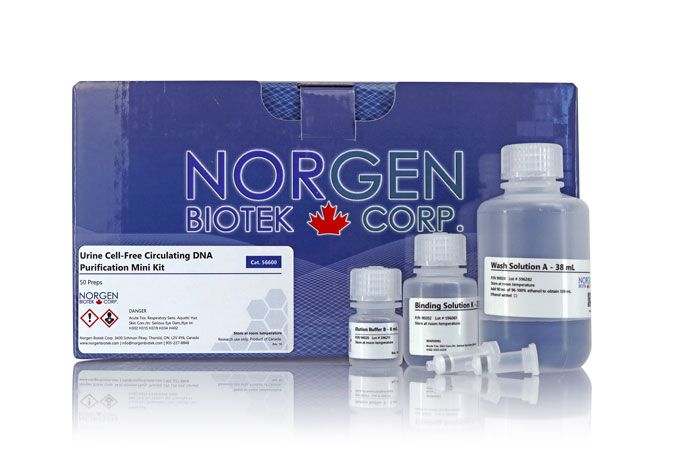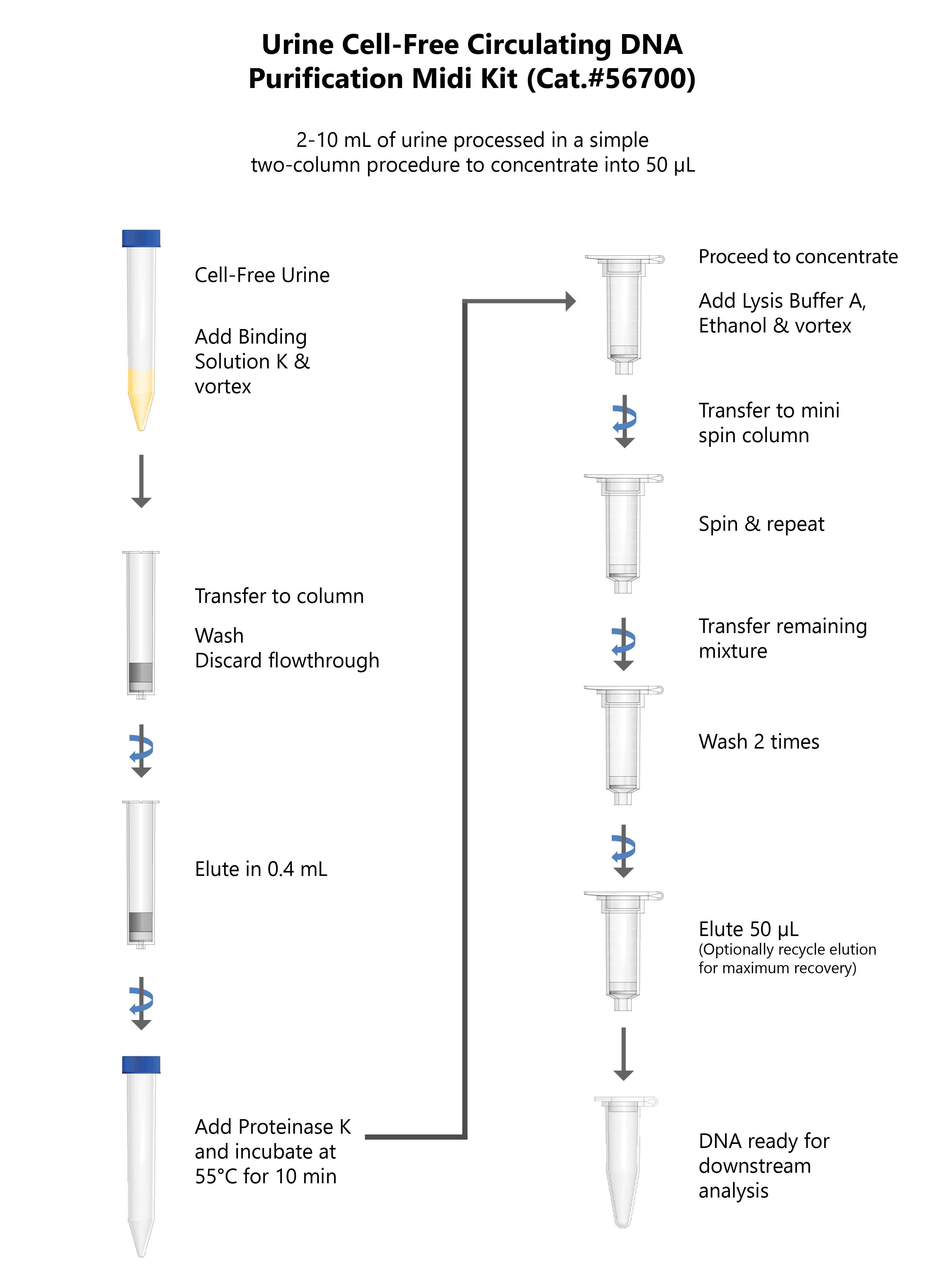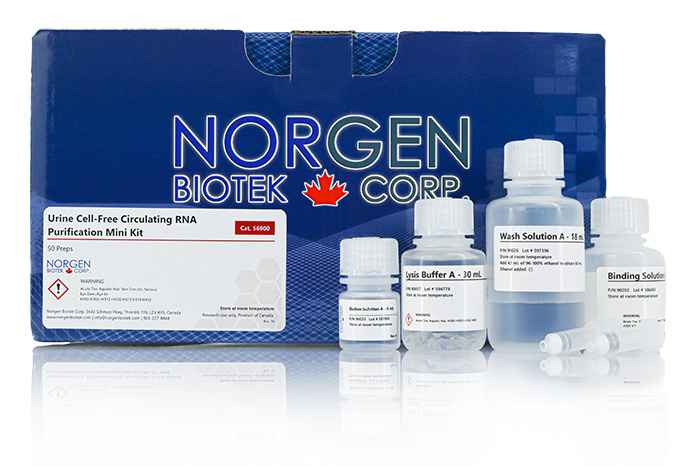Urine Cell-Free Circulating DNA Purification Kits
Purify and concentrate high quality, high purity and inhibitor-free cell-free circulating DNA

For research use only and NOT intended for in vitro diagnostics.
Urine Cell-Free Circulating DNA Purification Kits
Purify and concentrate high quality, high purity and inhibitor-free cell-free circulating DNA
Register today to receive an exclusive 15% off* on your first order.
Features and Benefits
- Isolate all sizes of circulating DNA from fresh, preserved or frozen urine samples
- Isolate viral DNA
- Versatile urine input volumes
- Concentrate circulating DNA into flexible elution volumes
- Isolate inhibitor-free cell-free circulating DNA
- Compatible with Norgen’s Urine Preservative and other commercially available urine preservatives
- Purification is based on spin column chromatography that uses Norgen’s proprietary resin separation matrix
These kits provide a fast, reliable and convenient method to purify and concentrate high quality, high purity and inhibitor-free cell-free circulating DNA as well as viral DNA from fresh, preserved or frozen urine samples. All components for the purification are provided in one convenient and fast kit for the easy processing of small input volumes of bodily fluids. The purified urine DNA is fully compatible with all downstream applications including PCR, qPCR, methylation-sensitive PCR and Southern Blot analysis, Microarrays and NGS.
Background
Recent evidence indicates that cell-free circulating DNA (cf-DNA) contains valuable information for the discovery of biomarkers that can help with early detection of certain cancer types and for monitoring the disease status. The advantage for using urine as a source for cancer biomarkers is that it can be acquired in large quantities without using invasive procedures. In addition, repeated sampling from the same individual is applicable, which facilitates longitudinal studies. There are many advantages favouring the use of urinary nucleic acids for cancer biomarker discovery over blood, tissue samples or other bodily fluids, including: (1) urine is non-infectious for HIV and less infectious for many other pathogens; (2) the profile of urinary nucleic acid is similar to that in plasma or serum; (3) nucleic acid purification from urine is technically much easier because of its low protein concentration (1000-fold lower than blood). Urine cell-free circulating DNA (cf-DNA) has been utilized for the early diagnosis, prognosis and monitoring of therapy for several cancer types and autoimmune diseases, as well as for investigating fetal DNA that is normally present in the maternal blood. This cf-DNA is usually present as short fragments, generally between 150 and 250 bp or its duplicates, and is derived either from the apoptotic process, necrotic process or from the fetus.
Urine Cell-Free Circulating DNA Purification Mini Kit
For sample volumes ranging from 250 µL to 2 mL.
Urine Cell-Free Circulating DNA Purification Midi Kit
For sample volumes ranging from 2 mL to 10 mL.
Urine Cell-Free Circulating DNA Purification Maxi Kit
For sample volumes ranging from 10 mL to 30 mL.
Details
Supporting Data
Figure 1. Purification of cell-free circulating DNA from different urine volumes. Norgen’s Urine Cell-Free Circulating DNA Purification Mini Kit (Cat# 56600) was used to purify circulating DNA from 500 µL, 1 mL and 2 mL fresh urine. Two microlitres of the purified DNA was then used as the template in qPCR reactions to assess the relative amount of the purified housekeeping 5S rRNA gene. The relative amount of the 5S rRNA gene is linearly increasing with increasing the sample input volume. Norgen's kit showed the most consistent and the highest recovery of the housekeeping 5S rRNA gene as compared to the other isolation method.
Figure 2. Linearity of DNA purified from increasing urine volumes. Norgen’s Urine Cell-Free Circulating DNA Purification Mini Kit (Cat# 56600) was used to purify circulating DNA from 500 µL, 1 mL and 2 mL fresh urine. Two microlitres of the purified DNA was then used as the template in qPCR reactions to assess the linearity of the purified housekeeping 5S rRNA gene from the different urine volumes. Norgen’s Urine Cell-Free Circulating DNA Purification Mini Kit was able to recover 97% of the 5S rRNA gene from 1 mL urine relative to the amount that is present in 500 µL Urine. Moreover, 92% of the 5S rRNA gene was recovered from 2 mL urine relative to the amount that is present in 1 mL urine.
Figure 3. Determination of the amount of inhibition present in urine cell-free circulating DNA samples when detecting the human 5S gene. DNA was isolated from 500 µL, 1 mL and 2 mL urine using Norgen’s Urine Cell-Free Circulating DNA Purification Mini Kit (Cat# 56600). Increasing volumes of the elution (2, 4 and 8 µL) were used in a 20 µL qPCR reaction to observe any decrease in Ct value. An increase in Ct values with increasing amount of template would be a clear indication of PCR inhibitors present in the sample. An increase in elution volume used as a template in the qPCR did not affect the Ct value generated from qPCR. In fact the Ct values tend to decrease with increasing the PCR input volume, indicating that DNA purified from urine using Norgen’s kit is free of the common inhibitors usually present in urine.
Figure 4. Purification of cell-free circulating DNA from different urine volumes. Norgen's Urine Cell-Free Circulating DNA Purification Midi Kit (Cat# 55700) was used to purify circulating DNA from 2 mL, 5 mL and 10 mL fresh urine. Two microlitres of the purified DNA was then used as the template in qPCR reactions to assess the relative amount of the purified housekeeping 5S rRNA gene. The relative amount of the 5S rRNA gene is linearly increasing with increasing the sample input volume. Norgen's kit showed the most consistent and the highest recovery of the housekeeping 5S rRNA gene.
Figure 5. Linearity of DNA purified from increasing urine volume. Norgen's Urine Cell-Free Circulating DNA Purification Midi Kit (Cat# 55700) was used to purify circulating DNA from 2 mL, 5 mL and 10 mL fresh urine. Two microlitres of the purified DNA was then used as the template in qPCR reactions to assess the linearity of the purified housekeeping 5S rRNA gene from the different urine volumes. Norgen's Urine Cell-Free Circulating DNA Purification Midi Kit was able to recover 99% of the 5S rRNA gene from 5 mL urine relative to the amount that is present in 1 mL Urine. Moreover, 93% of the 5S rRNA gene was recovered from 10 mL urine relative to the amount that is present in 5 mL urine.
Figure 6. Determination of the amount of inhibition present in urine cell-free circulating DNA samples when detecting the human 5S gene. DNA was isolated from 2 mL, 5 mL and 10 mL urine using Norgen's Urine Cell-Free Circulating DNA Purification Midi Kit (Cat# 55700). Increasing volumes of the elution (2, 4 and 8 µL) were used in a 20 µL qPCR reaction to observe any decrease in Ct value. An increase in Ct values with increasing amount of template would be a clear indication of PCR inhibitors present in the sample. An increase in elution volume used as a template in the qPCR did not affect the Ct value generated from qPCR, and in fact the Ct values tend to decrease with increasing the PCR input volume indicating that DNA purified from urine using Norgen's kit is free of the common inhibitors usually present in urine.
Figure 7. Purification of cell-free circulating DNA from different urine volumes. Norgen's Urine Cell-Free Circulating DNA Purification Maxi Kit (Cat# 56800) was used to purify circulating DNA from 10 mL, 20 mL and 30 mL fresh urine. Two microlitres of the purified DNA was then used as the template in qPCR reactions to assess the relative amount of the purified housekeeping 5S rRNA gene. The relative amount of the 5S rRNA gene is linearly increasing with increasing the sample input volume. Norgen's kit showed the most consistent and the highest recovery of the housekeeping 5S rRNA gene.
Figure 8. Linearity of DNA purified from increasing urine volumes. Norgen's Urine Cell-Free Circulating DNA Purification Maxi Kit (Cat# 56800) was used to purify circulating DNA from 10 mL, 20 mL and 30 mL fresh urine. Two microlitres of the purified DNA was then used as the template in qPCR reactions to assess the linearity of the purified the housekeeping 5S rRNA gene from the different urine volumes. Norgen's Urine Cell-Free Circulating DNA Purification Maxi Kit was able to recover 100% of the 5S rRNA gene from 20 mL urine relative to the amount that is present in 10 mL urine. Moreover, 100% of the 5S rRNA gene was recovered from 30 mL urine relative to the amount that is present in 20 mL urine.
Figure 9. Determination of the amount of inhibition present in urine cell-free circulating DNA samples when detecting the human 5S gene. DNA was isolated from 10 mL, 20 mL and 30 mL urine using Norgen's Urine Cell-Free Circulating DNA Purification Maxi Kit (Cat# 56800). Increasing volumes of the elution (2, 4 and 8 µL) were used in a 20 µL qPCR reaction to observe any decrease in Ct value. An increase in Ct values with increasing amount of template would be a clear indication of PCR inhibitors present in the sample. An increase in elution volume used as a template in the qPCR did not affect the Ct value generated from qPCR. In fact the Ct values tend to decrease with increasing the PCR input volume, indicating that DNA purified from urine using Norgen's kit is free of the common inhibitors usually present in urine.
|
Kit Specifications
|
|
|
Minimum Urine Input
|
250 μL
|
|
Maximum Urine Input
|
2 mL
|
| Size of DNA Purified |
All sizes of
DNA ≥ 50 bp |
| Elution Volume |
50-100 μL
|
| Time to Complete 10 Purifications |
15-20 minutes
|
| Average Yields |
Variable depending on specimen
|
*Please check page 6 of the product insert for average yields and the common DNA quantification methods.
Storage Conditions and Product Stability
All solutions should be kept tightly sealed and stored at room temperature. These kits are stable for 2 years after the date of shipment. The kit contains a ready-to-use Proteinase K, which is dissolved in a specially prepared storage buffer. The buffered Proteinase K is stable for up to 2 years after the date of shipment when stored at room temperature.
| Component | Cat. 56600 (50 preps) | Cat. 56700 (20 preps) | Cat. 56800 (10 preps) |
|---|---|---|---|
| Binding Solution K | 25 mL | 75 mL | 1 x 75 mL 1 x 25 mL |
| Proteinase K | 1.2 mL | 0.3 mL | 0.3 mL |
| Wash Solution A | 38 mL | 2 x 38 mL | 38 mL |
| Elution Buffer B | 8 mL | 15 mL | 15 mL |
| Mini Spin Columns | 50 | 20 | 10 |
| Midi Spin Columns | - | 20 | - |
| Maxi Spin Columns | - | - | 10 |
| Collection Tubes | 50 | 20 | 10 |
| Elution Tubes (1.7 mL) | 50 | 20 | 10 |
| Product Insert | 1 | 1 | 1 |
Documentation
FAQs
Mini, Midi, Maxi
We recommend the following steps to prepare frozen urine for isolation:
- Gently warm the sample to room temperature or 37°C for 5 min.
- DO NOT perform a centrifugation step after thawing frozen cell-free Urine samples - this will eliminate the precipitated proteins leading to loss of protein-bound cf-NA or exosomes.
- Proceed with the protocol.
We recommend the use of Norgen’s Urine Preservative when collecting urine samples. Norgen’s Urine Preservative is designed for the preservation of nucleic acids and proteins in fresh urine samples at ambient temperatures, therefore no protein precipitation will occur and the purified nucleic acids will be of a higher quality.
Citations
| Title | UAS™—A Urine Preservative for Oncology Applications |
| Citation | Cancers 2023. |
| Authors | Stephanie Jordaens, Amit Arora, Kyle W. MacDonald, Cameron Wood, Jhana O. Hendrickx, Karen Zwaenepoel, Christophe Deben, Wiebren Tjalma, Patrick Pauwels, Koen Beyers and Vanessa Vankerckhoven |


